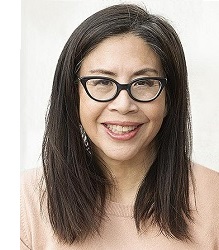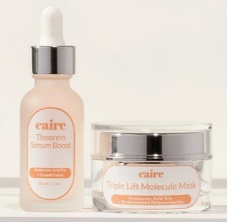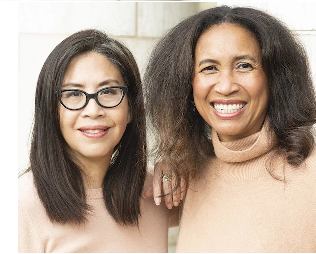

 Although Caire Beauty co-founder Celeste Lee showed an
entrepreneurial spirit while running the school store in elementary
school, the path to creating a beauty company was not a direct one.
While at the University of Pennsylvania, she found that “they have
their own track, they want you to go work for an investment bank, or
management consultancy or a PHA these were the three obvious
avenues.” Her first job was with a bank and she knew right away that
it was not for her, so she switched to advertising and then moved to
Japan. However, with limited job options there, she ended up in
banking once again.
Although Caire Beauty co-founder Celeste Lee showed an
entrepreneurial spirit while running the school store in elementary
school, the path to creating a beauty company was not a direct one.
While at the University of Pennsylvania, she found that “they have
their own track, they want you to go work for an investment bank, or
management consultancy or a PHA these were the three obvious
avenues.” Her first job was with a bank and she knew right away that
it was not for her, so she switched to advertising and then moved to
Japan. However, with limited job options there, she ended up in
banking once again.
Back in America, Celeste bid farewell to
the finance world and swore off any finance jobs. She found a
position with AMC Entertainment that combined her business sense
with her creative side. Celeste ran the editorial for the slide
program shown before movies as well as East Coast operations. From
there, she ended up moving more towards marketing when a college
friend tapped her to help develop a fragrance concept. The work kept
coming and she joined Givaudan, a manufacturer of flavours,
fragrances, eventually becoming a vice president.
Searching for more, Celeste realized she wanted to do something for
herself. “After doing this for a few years, I thought, you know
what, I'm tired of coming up with marketing ideas,” said Celeste,
“and I thought I can do this on my own as a consultant.” So she
started her own consulting company and continued coming up with
creative ideas for her clients in areas such as beauty, beverages,
and jewelry.
Even with her own consulting business, she still wasn’t completely fulfilled. “Over the years, I thought all these people that started these indie beauty brands, why isn’t that me?“ explains Celeste. Although she had developed many successful concepts for others, she never did for herself. “I had a lot of fear because again, that's just not the way that I was raised. And I think that for Asians, we're really raised to be not necessarily goody two shoes, but it's more about following patterns that are in front of us. And you just keep going. And eventually, you're going to achieve, hypothetically, a measure of success.” says Celeste, “But the truth of the matter is, it's a little bit soul-shattering. If you have any interest in creation; if you want to do something different.”
It wasn’t until her best friend, Lorrie King, told Celeste that she needed to act on her ideas. “She's like you got to stop talking, we have to do something. And she is a lot more motivated than I am.” recalls Celeste, “And she said the next time you have an idea, at least write it down on a piece of paper. Let's think about it.” The ultimate result was the creation of Caire Beauty.
 Both Celeste and Lorrie realized that the focus on
skincare was mostly targeted at women under a certain age. Products
were available that helped slow down skin damage while you were
young, there wasn’t anything that addressed the changes that happen
around menopause, which is the day when your period has stopped for
one year. “For every woman, one of the first signs is skin change,
they just don't know.” explains Celeste, “They have no idea that
it's being caused by this because there are multiple causes of
aging, and what most anti-aging skincare deals with are pollution
and UV rays.” She goes on to say, “ We have this really interesting
concept around what we call hormone-defying science.” Using tiny
hyaluronic acid (HA) molecules that are better absorbed, Caire
Beauty products work to replace the HA your body loses and to help
increase skin production.
Both Celeste and Lorrie realized that the focus on
skincare was mostly targeted at women under a certain age. Products
were available that helped slow down skin damage while you were
young, there wasn’t anything that addressed the changes that happen
around menopause, which is the day when your period has stopped for
one year. “For every woman, one of the first signs is skin change,
they just don't know.” explains Celeste, “They have no idea that
it's being caused by this because there are multiple causes of
aging, and what most anti-aging skincare deals with are pollution
and UV rays.” She goes on to say, “ We have this really interesting
concept around what we call hormone-defying science.” Using tiny
hyaluronic acid (HA) molecules that are better absorbed, Caire
Beauty products work to replace the HA your body loses and to help
increase skin production.
 So while Celeste
and Lorrie knew what they wanted to do with the product they
created, they needed to figure out the best way to go about it,
particularly when it comes to funding. “It's known that women don't
get funded. That's a fact and that everybody acknowledges it. I
think, depending on whose numbers you're looking at, 3% to 5%, of
just women's company's get funded. But when you look at African
American, Asian American, Latin American, it's far less,” says
Celeste. She also notes “One thing that we have observed is that we
had meetings with every major VC company, no question that we had a
meeting, but it's almost as if they're ticking a box off, oh, here's
my partner's African American, she's Asian American, let's talk to
them.” Celeste goes on to say, “I think getting beyond the first
meeting is even harder than it would be if we were just regular
women or regular founders. The expectation is so hard because, at
most, they will find one company, if any.”
So while Celeste
and Lorrie knew what they wanted to do with the product they
created, they needed to figure out the best way to go about it,
particularly when it comes to funding. “It's known that women don't
get funded. That's a fact and that everybody acknowledges it. I
think, depending on whose numbers you're looking at, 3% to 5%, of
just women's company's get funded. But when you look at African
American, Asian American, Latin American, it's far less,” says
Celeste. She also notes “One thing that we have observed is that we
had meetings with every major VC company, no question that we had a
meeting, but it's almost as if they're ticking a box off, oh, here's
my partner's African American, she's Asian American, let's talk to
them.” Celeste goes on to say, “I think getting beyond the first
meeting is even harder than it would be if we were just regular
women or regular founders. The expectation is so hard because, at
most, they will find one company, if any.”
Even with their business and financial
backgrounds, there has been quite a learning curve. However, the
knowledge they gained as part of the Entrepreneurs Roundtable Accelerators’
(ERA) program and the support ERA has provided have helped Celeste
and Lorrie more easily navigate the process. And while it’s still
nerve-wracking to pitch their company and seek funding, Celeste has
gotten more comfortable with it and realizes that it’s not
necessarily a bad thing. As she puts it, “you’ve got to use that
nervousness and that energy back into everything you do.”
In a Murky Sea of Mental Health Apps, Consumers Left
Adrift
by Jenny Gold
The Eyes Have It: Make-up to Make Your Eyes Pop
by Heidi Forbes
Asian America Women Olympic Gold Medalists
Who, What, Where and How: AAPI Organizations
Learn More: What Others Are Saying
How to Report Hate Crimes Against AAPIs